Most people aren’t invited to a funeral service outside of their own culture or religion every day.
So if you’re invited to a Jewish funeral service, it’s normal to be unsure about what to expect. Are there any unique traditions, etiquette, or customs to be aware of?
Generally speaking, a Jewish funeral lasts for 30 to 45 minutes and consists of prayers, readings, and eulogies. The funeral will be organized by a Jewish burial society (known as a chevra kadisha) to occur as soon as possible after the deceased’s death, usually within 24 hours. The funeral will be a closed casket service, as embalming is forbidden.
I spoke with several Jewish organizations and Hebrew congregations to learn more.
If you’ve been invited to a Jewish funeral, read on to learn everything you might need to know before attending.
In This Article
What To Expect at a Jewish Funeral
A funeral is an event to mourn the deceased, celebrate their life, and offer support to their loved ones. In this regard, Jewish funeral traditions are like typical Christian or secular funerals.
A traditional Jewish funeral includes mourners, prayers, readings, and eulogies. However, while there are many similarities with the religious practices of other types of funerals, there are also many differences.
At a Jewish funeral, the order of service is usually as follows:
Before a Jewish Funeral Service: Mourners Tear Keriah
Before the funeral service, family members will perform a Jewish tradition called keriah (or kriah). This is also known as the rending of garments.
Keriah occurs in a small private room where the immediate family gathers to tear or cut a piece of their clothes and say “Baruch dayan ha’emet,” meaning “God is the true Judge,” as a sign of their mourning and to demonstrate grief.
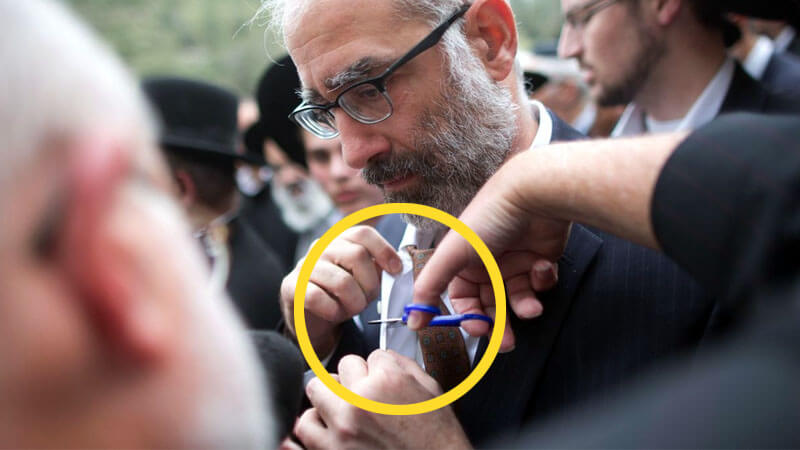
Those required to tear keriah are the closest relatives of the deceased, being their children, parents, siblings, and spouse, known as avelim (meaning “mourning family”).
In Reform Judaism, it is a custom for a black ribbon to be torn in place of a garment. According to the late Rabbi Maurice Lamm, author of The Jewish Way in Death and Mourning, Orthodox communities posit this is not enough.
After tearing keriah, family members will join funeral guests for the main service. In some cases, they will not join attendees until the burial.
At the Service: Prayers and Eulogy
You can expect the funeral service to last for 30 to 45 minutes and to take place at a Jewish cemetery, sometimes referred to as a bet olam. Depending on local practices, Jewish funeral services might also occur at a chapel, synagogue, or funeral home.
There’s no “prescribed” funeral schedule to follow. Still, there are some things you can typically expect at a Jewish funeral service:
First, there will be prayers and reading of Psalms. Some will be in Hebrew, and some will be in English. Usually, the officiating Rabbi will read the Hebrew, and someone from the chevra kadisha or close friends or family members will read the English. As a guest, you will not typically have to say anything.
Following a silent prayer, the officiating Rabbi, funeral director, or someone close to the deceased will give a eulogy (Hesped).
Related Article: How To Write a Eulogy: Tips, Structure, & Examples [Guide]
At the Graveside
At the end of the main service, attendees will leave the funeral home or chapel to move to the graveside for the burial of the deceased’s body. The casket will be carried by a funeral procession that may stop several times, depending on the custom adhered to. Once the coffin has been lowered, family and others will help to fill the grave.
An interesting ritual at the graveside ceremony is that the shovel will not be passed from one person to the next. While burying the coffin, each family member will place the shovel or spade down, and the next person will pick it up.
Several texts are recited during the burial; these include prayers like “Tzidduk Hadin,” “El Malei Rachamim,” and the “Kaddish.”
The mourner’s kaddish is a special memorial prayer read at the graveside during the burial by the mourners and the Rabbi. Traditionally, kaddish requires 10 Jewish men to be present.
After the Service: Shiva, Minyan, and Shloshim
Following the burial ceremony, guests will disperse. If you were close to the deceased, you might be invited to another smaller reception later in the day. However, this is not guaranteed.
Jewish people are also expected to wash their hands after the cemetery service.
At this point, mourners will be in an “official” state of mourning. So there are certain things they will and won’t be able to do. They get looked after and cared for. They “sit shiva“:
Sitting Shiva
After burying the body, the deceased’s closest family members will light the “shiva candle.” This marks the beginning of seven days of “sitting shiva” in the deceased’s home. This is an intense mourning period for the deceased’s closest family to process their grief and bereavement.
Sitting shiva involves sitting on a low stool in a state of mourning. The deceased’s blood relations mourn while everyone else looks after them. Avelim don’t prepare food or do any work during this time.
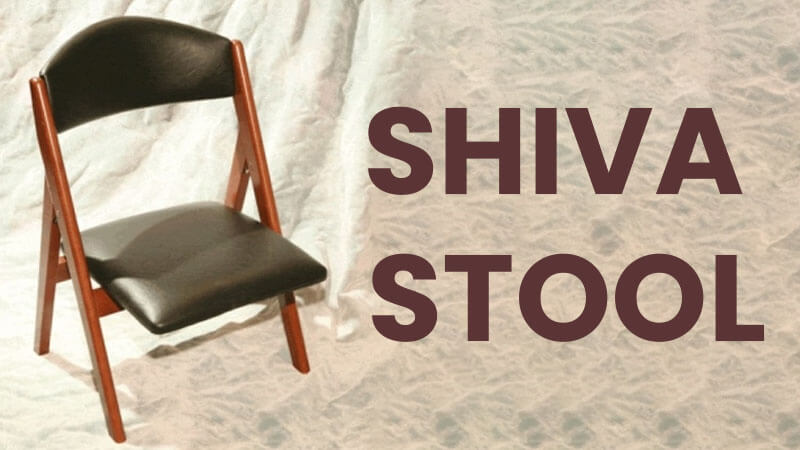
At the start of shiva, mourners will have their first private meal after the burial. This meal traditionally includes bread, bagels, and a hard-boiled egg symbolizing the circle of life.
The responsibility for looking after the deceased’s family is known as nihum avelim, meaning “comforting mourners.”
Minyan
After the funeral, in the evening, it is a custom for those close to the deceased to have what is called a minyan.
A minyan is a memorial service at the mourners’ home where prayers and other eulogies are repeated. The purpose of the minyan is to comfort the mourning family at the beginning of shiva. It is another way to pay final respects to the deceased. People who could not attend the funeral might go to the minyan instead.
Further Jewish Mourning Traditions
Following the week of sitting shiva, a second 30-day mourning period will begin, known as shloshim, during which the family of the deceased will continue to recite daily prayers to honor them.
On the yearly anniversary of the deceased’s passing, it is customary to light a candle in commemoration. This is yahrzeit, which relates to the Jewish belief in a mitzvah (“good deed”) that the deceased’s family carries out to bring merit to the deceased.
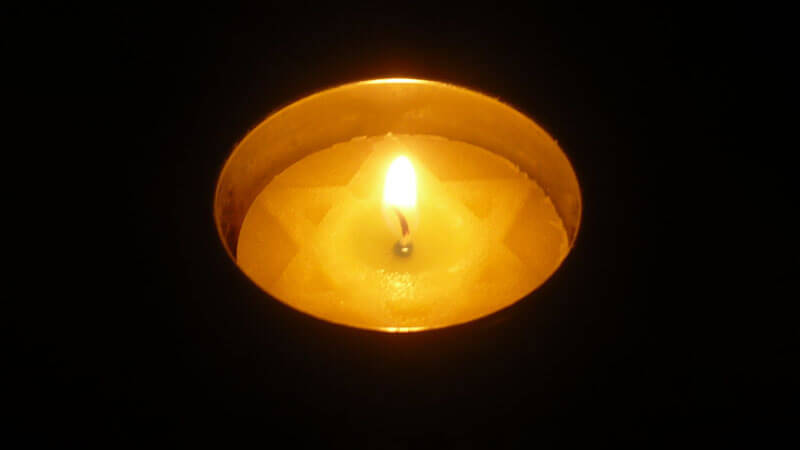
Denominational Differences
It is important to note that different types of Judaism have different beliefs on death. While the funeral customs set out above are likely to be strictly followed by conservative Jewish cultures like Orthodox and Conservative Judaism, followers of more liberal denominations like Reform and Reconstructionist Judaism may be more flexible.
Can Non-Jewish People Attend Jewish Funerals?
Non-Jewish People can attend Jewish funeral services. It is a sign of respect to obtain a basic understanding of Jewish funeral etiquette first, but being outside the Jewish faith will not prevent you from attending the funeral of a Jewish person.
If you were a close male friend of the deceased, you might even be asked to be a pallbearer (or an honorary pallbearer if you are not physically able to help carry the casket).
This will naturally depend on the wishes of the deceased’s family. However, it is not unusual for people of other faiths to have this type of involvement in Jewish funerals.
Preparing to Attend a Jewish Funeral: Etiquette
Should You Bring a Gift?
You may have the opportunity to visit the mourning family during shiva.
However, bringing a gift with you is considered an etiquette mistake. Sending flowers, food, or what might be an ordinary gift at a secular or Christian funeral is discouraged. Why?
Bringing gifts to Jewish mourners is seen as in poor taste as it can distract them from their grief.
If you wish to express your condolences, customary alternatives include donating to a charity or planting a tree to honor the deceased (tzedakah).
What Should You Wear to a Jewish Funeral?
Men and women should typically wear respectful dark-colored clothing at a Jewish funeral. For men, wearing a button-down shirt with dress pants is appropriate. For women, dressing in any modest attire should suffice. Male guests must also wear a head covering or hat to show respect.
An ordinary hat or cap is fine. If you don’t have a head covering, you will usually be provided with a type of Jewish hat known as a kippah or yarmulke at the entrance to the chapel.
Where To Go For Help: Chevra Kadisha
A chevra kadisha is a type of Jewish “burial society” that ensures all Jewish people who die receive a proper burial. In most Jewish communities around the world, the chevra kadisha will be in charge of planning the funeral.
When invited to non-Jewish funerals, people usually reach out to the deceased’s family members or the funeral home with questions. However, the chevra kadisha organizes Jewish funerals, so this is where you should go if you have questions or need help.
Frequently Asked Questions
When Does a Jewish Funeral Take Place?
Jewish funerals occur as soon as possible after death, traditionally within one day. However, the funeral can’t take place on Jewish holidays or the Sabbath, so it won’t be held on a Friday evening or Saturday. There is flexibility if the body needs to be transported or the family is unavailable.
Jewish funerals usually occur so quickly because the body is not embalmed, and autopsies are avoided when possible. The reason for this is that it’s a tradition in Judaism that the body is not cut unnecessarily, as this can be considered desecration of the body.
There are, of course, exceptions. For example, if an autopsy is required for legitimate purposes or if donating an organ will save a life. Government regulations will also be prioritized over Jewish customs.
There are other exceptions when it comes to embalming. If a body needs to be transported overseas, then it will have to be embalmed, and the funeral will naturally take place later than it usually would. This is common when tourists die overseas.
How Is the Body Prepared for a Jewish Funeral?
As with planning the funeral, the chevra kadisha is responsible for preparing the body for the service.
To prepare the body for a Jewish funeral, the chevra kadisha will clean the deceased (taharah) and dress them in a plain burial shroud (tachrichim). Someone will then place the body in a biodegradable pine coffin/casket.
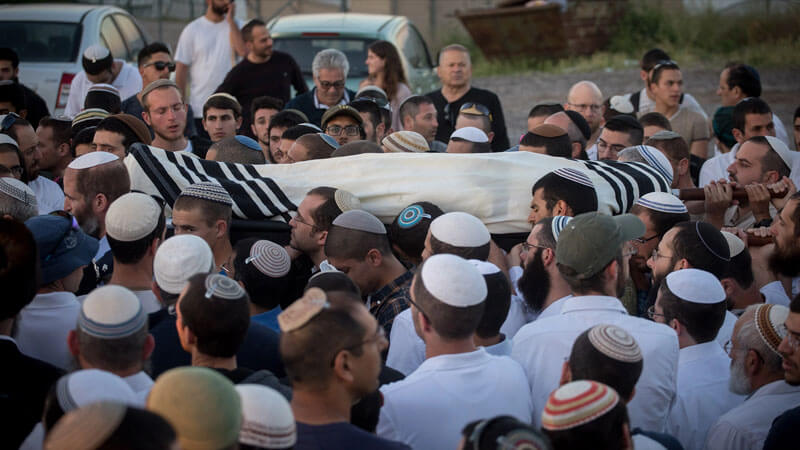
Typically, all Jewish people are buried in this same manner. This is symbolic of the fact that all are equal in death, regardless of wealth and status.
Jewish men are also dressed in their prayer shawl, known as a talit, before the actual burial. If a man does not have a prayer shawl, the chevra kadisha will donate one.
Will the Body Be Visible at the Service?
The body will not be visible at a Jewish funeral but will instead be sealed in a plain wooden coffin as soon as it has been washed and dressed. Public viewings and wakes are also not appropriate because the Jewish faith forbids viewing the face of a dead person.
However, just because there won’t be a wake doesn’t mean there aren’t other services at which mourners can pay their respects and express their condolences:
If invited, people sometimes go to a loved one’s home after the funeral ceremony for a cup of tea or a meal. However, this won’t take place at the chapel.
Will the Body Be Cremated at a Jewish Funeral?
For many Jews, cremation is not an option at Jewish funeral services because it is desecration of the body and may violate biblical commands. This is the same reason embalming and autopsies are typically prohibited. In recent times, cremation is also avoided due to its association with the Holocaust.
However, according to Rabbi Victor Appell, Reform Judaism takes a more flexible approach. While still affirming their preference for the traditional Jewish practice of burial, Reform Jews believe:
“While there is no clear-cut prohibition of cremation in the halachic literature (literature of Jewish law). The Reform rabbinate seeks to encourage the traditional practice of burial in the earth whenever possible and some Reform rabbis do not officiate at memorial services for those who have chosen cremation.”
Rabbi Victor Appell, Associate Rabbi, Temple Emanu-El of Westfield, New Jersey
What Is Shemira?
Shemira is the Jewish tradition of watching over the deceased’s body before the burial. You may hear shemira referred to in the context of Jewish funerals, but it is not compulsory and is now less common than it used to be. This is primarily due to inadequate resources to sustain this practice.
The Bottom Line
Attending any event outside your own culture of religion can be intimidating.
Thankfully, Jewish funerals aren’t that difficult. Yes, some traditions, customs, and rules differ from what you might be used to, but as long as you are respectful, you should get by just fine.
If you want to learn more, here’s a helpful interview with Rabbi Mitchell Berkowitz:
And if you have any questions? Just leave us a comment below – we respond quickly!

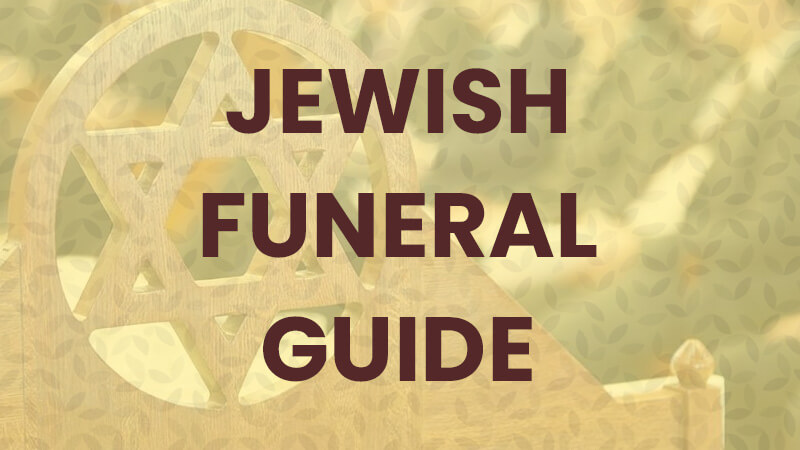









2 Responses
My husband and father of my 3 children died overseas and I am having the date for his funeral this Tuesday. I am not Jewish but I organised a Jewish cremation I for him. What as a wife should I wear? I was going to wear a simple long black dress. Is it right please? My 2 tenagers? He just arrived yesterday on the funeral home and I was told I will have to deliver the clothes he will have to wear in his coffin. I thought to bring him a nice suit but as I am reading your article I don’t think that’s the right thing for him to wear. I am having the most sad and difficult times in my life as I am trying my best to do it right and comfort our children that are very upset at this time. Please what does my husband wear inside the coffin? Where can I buy it? Please help me
Hi Luiza. I’m really sorry for your loss. My suggestion is that you call you local chevra kadisha. They will be able to provide you with accurate information.